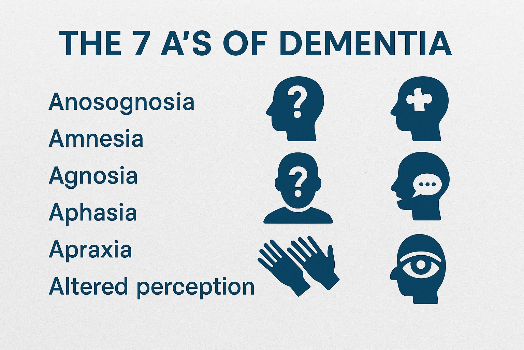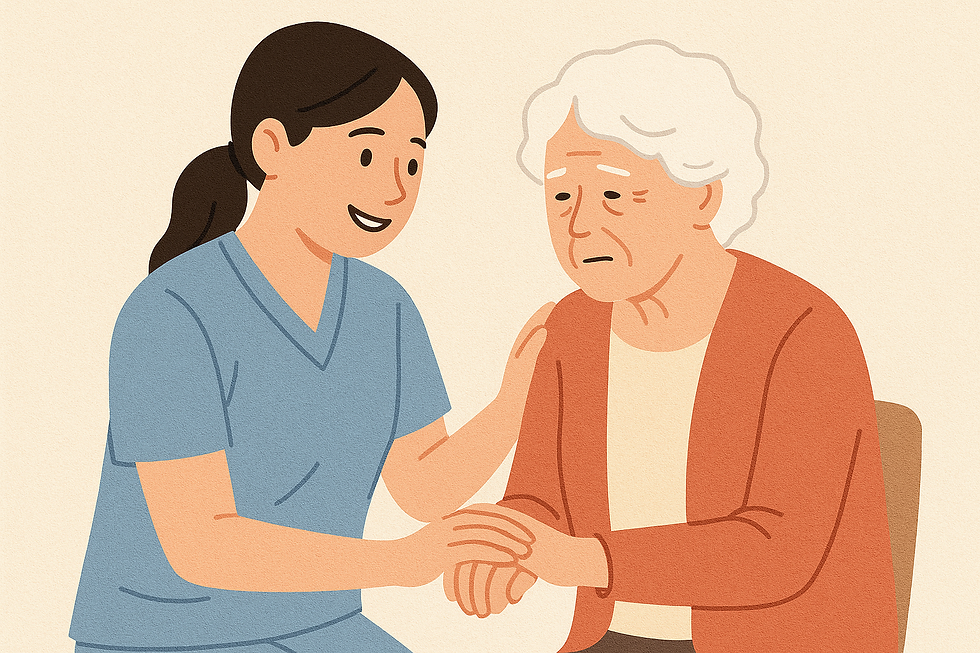The 7 A's of Dementia: Understanding Cognitive Changes
- May 21, 2025
- 4 min read
Updated: Jul 2, 2025
If you’re caring for someone with dementia, you might feel confused, tired, or even helpless at times. Maybe your loved one doesn’t remember your name. Maybe they get angry or scared for no reason. Or maybe they don’t seem like the person you used to know. This can be very hard, but you’re not alone.
Dementia changes how the brain works. These changes affect memory, speech, movement, and emotions. When you understand how dementia affects the brain, you can better understand your loved one’s behavior. One helpful way to learn about these changes is to look at something called the “7 A’s of Dementia.”
The 7 A’s show the main ways dementia changes the brain. Each one starts with the letter “A,” and each one explains a different problem your loved one may have. When you learn what the 7 A’s of dementia mean, you’ll be able to give better care with more patience and love.
What are the 7 A's of Dementia?

The 7 A’s of dementia describe the most common brain changes caused by the disease. These changes can affect how your loved one thinks, sees, moves, speaks, and behaves. They aren’t doing these things on purpose; these changes are happening because parts of their brain are damaged.
The 7 A's of Dementia: Key Cognitive Changes
Let’s look at each one more closely.
Amnesia (Memory Loss)
Amnesia means losing your memory. With dementia, short-term memory is often the first to go. Your loved one might forget what happened five minutes ago but remember something from 30 years ago. They may forget appointments, where they put things, or what they just ate. They may repeat questions or stories over and over.
What you can do:
Be patient when they repeat things.
Use simple reminders or notes.
Keep a daily routine to help them feel more secure.
Agnosia (Trouble Recognizing People or Things)

Agnosia means the brain has trouble recognizing things, even though the eyes and ears still work. Your loved one might look at a hairbrush and not know what it is. Or they may look at you and not realize you are their child.
What you can do:
Use gentle reminders: “This is your daughter, Mary.”
Show and explain what an item is before using it.
Stay calm if they don’t recognize you—it’s not personal.
Aphasia (Problems with Language)
Aphasia means trouble speaking or understanding words. Your loved one may struggle to find the right word. They may say one thing but mean another. Sometimes, they may not understand what you are saying at all.
What you can do:
Speak slowly and clearly.
Use simple words and short sentences.
Give them time to respond.
Use gestures or pictures to help communicate.
Apraxia (Difficulty Doing Tasks)

Apraxia means your loved one can’t do tasks they used to do, even though their muscles work fine. They might forget how to brush their teeth, button their shirt, or use a fork.
What you can do:
Break tasks into small steps.
Show them what to do by doing it first.
Offer help, but let them try first if it’s safe.
Anosognosia (Not Knowing They Are Sick)
Anosognosia means your loved one doesn’t know or believe they have a problem. They may say, “I’m fine,” even if they’re clearly confused or need help. They might get upset if you try to help them.
What you can do:
Don’t argue or try to convince them they’re sick.
Stay calm and redirect the conversation.
Use kind and simple language to explain what you’re doing.
Altered Perception (Seeing or Hearing Things Differently)

This means your loved one may see or hear things in a strange way. Shadows might look like people. A black rug may look like a hole in the floor. These changes can cause fear, confusion, or even anger.
What you can do:
Keep rooms well-lit and clutter-free.
Use night lights to reduce shadows.
Gently explain what is real and what is not, but don’t argue.
Apathy (Lack of Interest or Motivation)
Apathy means your loved one may not feel like doing anything. They may seem bored, tired, or uninterested. This is not laziness. The part of the brain that controls motivation is not working properly.
What you can do:
Invite them to do simple, enjoyable activities.
Keep a gentle routine.
Don’t force them, but offer choices and encouragement.
How Understanding the 7 A's Can Improve Dementia Care

When you understand the 7 A’s, you can see your loved one’s actions in a new light. Instead of thinking they’re being difficult, you’ll realize their brain is working differently. This helps you respond with more kindness and less frustration.
You can:
Stay calm when they forget or get confused
Help them feel safe and supported
Find better ways to talk and connect
Adjust your care to match their needs
Reduce stress for both of you
Understanding the 7 A’s also helps you explain their behavior to other family members or caregivers. Everyone can work together to support your loved one with respect and love.
Need Help Caring for a Loved One with Dementia?
You don’t have to do it alone. At A Circle Of Love Home Care, we understand the challenges of dementia care and are here to support you with patience, compassion, and expert help.
Contact us today to learn how our trained caregivers can bring comfort, safety, and peace of mind to your family.
Final Thoughts
Dementia can be a tough journey, but knowledge can make it easier. The 7 A’s of dementia help you understand what your loved one is going through. These changes are not their fault—they are signs of how the brain is being affected.
By learning these A’s, you become a stronger, more caring support for your loved one. You’ll know what to expect, how to help, and when to be patient. And most importantly, you’ll be able to give care with more understanding and love.
You’re doing important work. Keep learning, keep caring, and don’t forget to care for yourself, too.




Comments